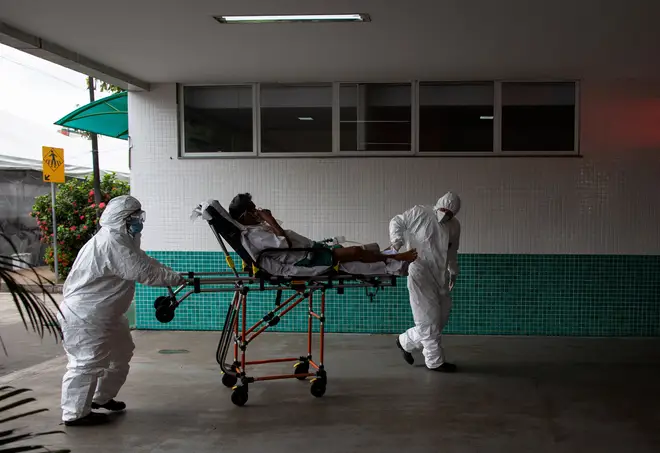
Simon Marks 3pm - 7pm
15 January 2021, 11:12 | Updated: 15 January 2021, 13:03

One of two Brazilian coronavirus variants was detected in the UK ahead of ministers banning the arrival of travellers from South America to limit the spread of a concerning new strain, a leading virologist has said.
Professor Wendy Barclay, who is advising the Government's Covid-19 response, said the variant may have been "introduced some time ago" and that it was not the variant of concern that was picked up in travellers going to Japan.
Earlier on Friday, Transport Secretary Grant Shapps said he was "not aware" of any cases of the Brazilian coronavirus variant in the UK as travellers from across South America were banned from entry to the UK.
Read more: Brazil Covid strain: What is the new variant? Have flights been stopped?
The ban, which also covers the Central American state of Panama and Portugal - due to its strong travel links with Brazil - and the former Portuguese colony of Cape Verde, came into force at 4am on Friday.
The restrictions were put in place in response to concerns of a Brazilian variant that shares with the new South African strain mutations that are associated with a rapid increase in cases in areas where there have already been large outbreaks of the disease.

Nick Ferrari challenges Shapps over speed of travel ban
Mr Shapps also defended delays to the Brazil travel ban and pre-departure coronavirus testing, telling LBC the Government has done a good job in managing the borders during the pandemic.
Asked why it had taken four days from the New and Emerging Respiratory Virus Threats Advisory Group (NERVTAG) discussing the variant to the travel ban's imposition, Mr Shapps told Nick Ferrari that move was "extremely quickly in terms of genome sequencing" but said it was a "precautionary measure."
Challenged over the delay to pre-departure testing, which was meant to come into force today but has been delayed until Monday, Mr Shapps said it was for "practicality reasons" because of the number of different tests available worldwide.
Read more: R rate drops below 1 in several regions with infections in England falling
Prof Barclay, head of the G2P-UK National Virology Consortium, a new project set up to study the effects of emerging coronavirus mutations, said: "There are two different types of Brazilian variants and one of them has been detected and one of them has not.
"In the databases, if you search the sequences, you will see that there is some evidence for variants from around the world, and I believe including the Brazilian one, which probably was introduced some time ago.
"That will be being traced very carefully."

Virologist brands travel ban 'too little too late'
The Imperial College virologist added that both Brazilian variants - one of which was detected by travellers in Japan and the other which is more prevalent in Brazil currently - have mutations that suggest "they might impact the way that some people's antibodies can see the virus".
"It is really important that we carry out this work now, and carry it out carefully, and in several different laboratories, to really firm up those results because they have big implications," she added.
Shadow home secretary Nick Thomas-Symonds said the ban, which includes an exemption for hauliers travelling from Portugal to allow the transport of essential goods, was a "necessary step" but accused ministers of incompetence and "lurching from one crisis and rushed announcement to another".
There were tentative signs the national lockdown was bringing infection rates under control in some parts of England.
Cambridge University researchers said the reproduction rate of the virus - known as R - is below 1 in the East of England, London, the South East, West Midlands and Yorkshire and the Humber, meaning the number of cases should be shrinking.
However, they believe it is still above 1 in the South West, North West, North East and East Midlands, indicating case numbers could still grow in those regions.
Meanwhile, the latest figures showed the number of people across the UK to have received the first dose of a Covid-19 vaccine has passed 2.9 million.
Public Health England (PHE) also released data showing infection rates had fallen in most regions of England across all age groups apart from the over-80s, in a further sign that lockdown measures are having an impact.
At the same time, however, the PHE surveillance report noted there were more people being admitted to hospitals and intensive care units.
NHS England said around one in five major hospital trusts in England had no spare adult critical care beds on January 10.
The time lag between a fall in cases and an impact on the death toll means grim figures are likely to remain a factor for some time.
The latest official figures showed a further 1,248 people had died within 28 days of testing positive for Covid-19 in the UK as of Thursday.